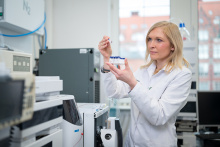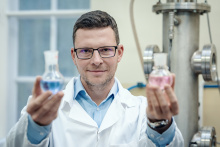Date added: 2021-04-29
Iconic Scholars - first grants for the most promising researchers of Gdańsk Tech

Iconic Scholars is a program aimed at acquiring world-renowned scientists and supporting the development of Gdańsk University of Technology employees with special potential in building a significant position in world science. Financial and organizational support for the most promising university researchers may include, among others, funds for the purchase and maintenance of research equipment as well as the organization and maintenance of a research team. Applications for support may be submitted by vice-rectors, deans, chairmen of scientific disciplines and fields councils as well as PRA center coordinators. The grants are awarded by the rector on the basis of negotiations and expert evaluation carried out by persons indicated by the rector. The program also provides bonuses, for example for becoming a Clarivate Highly Cited Researcher and for authorship or co-authorship of 'article' publications in Nature or Science.
The first of the projects implemented under the Iconic Scholars program by PhD, DSc, Eng. Justyna Płotka-Wasylka, professor at Gdańsk Tech, concerns the development of a method for the determination of selected biomarkers of popular xenobiotics (and their metabolites) in urine samples absorbed in the gel of disposable diapers of newborns and babies who do not yet control urination.
– The urine contained in the diaper can be a kind of reservoir for markers of the baby's health. These biomarkers may indicate many diseases in children, but also indicate, for example, potential exposure to various types of environmental pollutants during fetal life or in the first stages of a child's development - explains Prof. Justyna Płotka-Wasylka. - Collection of urine from a child of this age is treated as a non-invasive procedure, but due to the currently used methods, it is also very labor-intensive and stressful for the child and the parent. My experience as a mother of two young children was an inspiration to try to develop a method of urine recovery from a disposable diaper and to prepare a sample for further analysis.
The project, which will be implemented in cooperation with scientists from the Netherlands, Brazil and Mexico, is characterized by an innovative approach, and its effects may form the basis for biomonitoring of exposure to selected human xenobiotics from the first days of life.
In turn, the purpose of the research carried out by PhD, DSc, Eng. Grzegorz Boczkaj, professor at Gdańsk Tech, is to develop effective chemical water and wastewater treatment processes using the most promising solutions involving the induction of targeted oxidation or reduction reactions with reactive forms of oxygen or hydrogen.
The research is to be carried out with the use of external oxidants in the form of persulfates and sub-sulfates - which is currently the most popular research direction - however, ongoing monitoring of current state of the art in the literature, carried out during the project implementation, may prove the validity of research based on other innovative types of reagents.
– The efficiency and degradation mechanisms will be compared with classic reagents used as oxidants or reducing agents. In order to effectively activate the introduced reagents to generate radical species, additional factors will be used in the form of cavitation, UV light, ultrasounds and heterogeneous catalysts - says Prof. Grzegorz Boczkaj.
The research will be carried out in cooperation with scientists from the USA, China, India, Pakistan and Iran.
More information about the research work of prof. Boczkaj can be found in the article New pro-environmental chemical engineering solutions
-----------------
PhD, DSc, Eng. Justyna Płotka-Wasylka, professor at Gdańsk Tech, graduated from the Faculty of Chemistry at Gdańsk Tech in 2010 in the field of Environmental Protection Technologies and began scientific work at Gdańsk Tech, obtaining a doctorate in chemical sciences in 2014, and in 2019 – the title of habilitated doctor. Since 2014, she has been working at the Department of Analytical Chemistry in a scientific and didactic position, currently as a professor at Gdańsk Tech. In 2018-2021, she was a member of the Council of Young Scientists at the Ministry of Science and Higher Education. Since 2018, she has been an editor in the Microchemical Journal. She was appointed as an expert in the Scientific Academic Exchange Agency. In autumn 2020, she joined the expert committee in the evaluation of applications for the award of the minister of higher education and science in 2020 and 2021. She is the author and co-author of 60 publications published in journals from the JCR list (Hirsch index value is 19/21 (Web of Science / Scopus). In addition, she is a laureate of numerous scientific awards, including the Award of the Polish Academy of Sciences in Gdańsk for young scientists in the category of science and of the Earth sciences for the publication and of the award of the Polish Academy of Sciences in the Best Habilitation competition 2019. She is also a scholarship holder of the Award of the Minister of Science and Education. Since 2021 she has been managing a grant project entitled "Disposable baby diapers: monitoring selected toxic compounds by using new analytical methods" awarded by The National Science Center as part of the OPUS 19 competition.
Scientific activity of Justyna Płotka-Wasylka is focused on the search and development of new analytical methodologies for the determination of bioactive compounds at the trace level in samples characterized by a complex matrix composition. The mainstream of her interests is based on research related to food safety and quality in terms of the content of biogenic amines, including baby food, alcoholic beverages (wine, beer) and related products. The research interests of prof. PłotkaWasylka also include the issues of using disposable diapers as a reservoir for markers of a child's health.
PhD, DSc, Eng. Grzegorz Boczkaj, professor at Gdańsk Tech, is a graduate of the Faculty of Chemistry at Gdańsk Tech (2008, major in Chemical Technology - Technologies for the Refinery and Petrochemical Industry), with which he has associated his entire scientific career. He defended his doctorate with distinction in 2012 (chemical technology), and he was awarded the postdoctoral degree in 2017 (technical sciences / chemical technology).
Prof. Boczkaj manages a research team that carries out innovative research in the field of chemical engineering, separation techniques and environmental engineering. In addition, he managed research projects with a total value of approximately PLN 4 million (OPUS and SONATA Bis, LIDER, SONATA, IUVENTUS PLUS, PRELUDIUM). Currently implemented projects concern research on the development of new types of Deep Eutectic Solvents and their applications (SONATA Bis) as well as research on chemical processes occurring under cavitation conditions (OPUS).
Currently, he is the mentor of three laureates of the. S. Ulam’s program (NAWA). He is the editor of special issues of Catalysts and Applied Sciences journals and is a member of the scientific council of Separations. He was appointed as an expert by the NSC, NCBiR and NAWA. The scientific achievements include over 100 publications (including 8 currently having the status of Highly Cited Paper according to Clarivate Analytics), chapters in books and reports on work for the economic environment; high RGscore (2021) exceeding 110 (ResearchGate); the status of "top peer reviewer" (1 percent of the most active reviewers of scientific publications in the world) of the Publons website in several categories; the Hirsch-index value is 26/28 (Scopus / Google Scholar).
-
2025-11-26
Students scholarship (LoBG)
-
2025-10-24
Success Stories 4 – Gabriela





